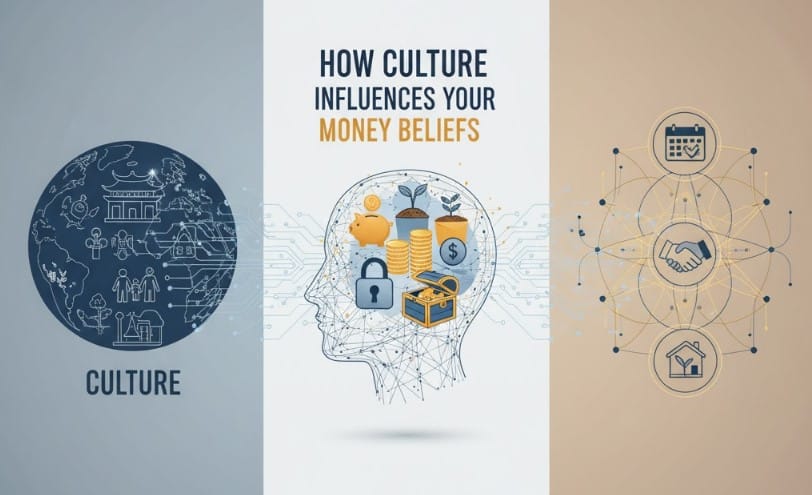Introduction
Money isn’t just about math — it’s about meaning.
The way we think, spend, save, or invest often reflects the stories we inherited, not just the choices we make.
Every culture carries its own unspoken rules about wealth, success, and generosity.
Some celebrate financial ambition; others prize humility or communal sharing.
Over time, these beliefs form the foundation of our personal money mindset — influencing everything from our spending habits to our financial confidence.
Understanding how culture shapes your money beliefs is the first step toward rewriting the parts that no longer serve you.
🧭 1. What Are Money Beliefs?
Money beliefs are the core ideas — often subconscious — that guide how you relate to money.
They influence:
- How you earn (“Money is hard to make.”)
- How you spend (“I shouldn’t spend on myself.”)
- How you save (“I need to hoard for safety.”)
- How you give (“It’s selfish to have too much.”)
These beliefs aren’t random — they’re shaped by cultural norms, family dynamics, and lived experience.
When we understand the origins of these patterns, we gain the freedom to choose new, more empowering beliefs.
🌍 2. How Culture Shapes Your Relationship With Money
Culture defines what is considered normal, respectable, or shameful around money.
Here’s how that influence shows up across different dimensions:
💬 a. Family Values
Family is often the first “financial classroom.”
You might have grown up hearing:
- “We can’t afford that.”
- “Money doesn’t grow on trees.”
- “Rich people are greedy.”
These statements carry emotional weight and form early scripts that continue into adulthood.
🏘️ b. Community Expectations
In collectivist cultures, financial success is often shared — supporting parents, siblings, or extended family is a duty.
In individualistic cultures, success is personal — financial independence and self-reliance are emphasized.
Neither is wrong — but both can create tension when personal goals clash with cultural expectations.
📜 c. Gender Norms
Cultural gender roles deeply influence how people approach money.
In many societies, men are taught to be providers, while women are encouraged to be caretakers or consumers.
Breaking out of these expectations can create guilt, shame, or internal conflict — even when pursuing financial freedom.
(👉 Internal link idea: “Money and Femininity: Power, Independence, and Identity.”)
🌐 d. Religion and Spirituality
Faith traditions also shape money beliefs — from viewing wealth as divine blessing to seeing it as a potential source of moral danger.
Understanding these frameworks helps you separate spiritual values from limiting financial narratives.
💭 3. Common Cultural Money Scripts
Psychologists and financial therapists often refer to “money scripts” — recurring internal stories that guide our behavior.
Here are a few that commonly emerge across cultures:
| Money Script | Underlying Belief | Impact |
|---|---|---|
| “Money is evil.” | Wealth corrupts character. | You may reject financial success or under-earn. |
| “I must provide for everyone.” | Love equals financial sacrifice. | Leads to burnout or debt. |
| “I’m not good with money.” | Financial literacy isn’t for people like me. | Keeps you dependent or disempowered. |
| “If I have more, others will have less.” | Wealth is a zero-sum game. | Creates guilt about success. |
Recognizing these narratives is the first step toward rewriting them.
🔎 4. How Generational Trauma Affects Financial Behavior
Money beliefs often travel across generations — especially in families shaped by war, poverty, migration, or inequality.
If your grandparents survived scarcity, they may have passed down values of saving, fear of risk, or distrust of institutions.
Conversely, those raised in abundance might struggle to appreciate money’s effort and responsibility.
This intergenerational transfer creates financial trauma — emotional baggage around money that influences modern decisions.
Healing begins by acknowledging:
“Their experiences shaped their beliefs — but I get to choose mine.”
🌿 5. The Role of Media and Modern Culture
In the digital age, culture isn’t just inherited — it’s consumed.
Social media, advertising, and influencer culture redefine what “success” looks like, often promoting unrealistic financial ideals.
Constant exposure to luxury lifestyles can trigger comparison, shame, or overspending, especially when financial worth is tied to social validation.
To reclaim financial autonomy, curate what you consume — and remind yourself that true wealth is alignment, not appearance.
💡 6. How to Identify and Reframe Limiting Money Beliefs
Once you recognize your cultural and emotional conditioning, you can begin to reprogram your money mindset.
🔹 Step 1: Notice the Language
Write down phrases you heard about money growing up.
Which ones feel true? Which ones hold you back?
🔹 Step 2: Trace the Origin
Ask: Where did this belief come from?
Understanding its origin helps you see it as learned, not inherent.
🔹 Step 3: Redefine the Belief
Example:
- Old belief: “Talking about money is rude.”
- New belief: “Discussing money helps me make informed, confident decisions.”
🔹 Step 4: Educate Yourself
Financial literacy breaks generational and cultural barriers.
Learn about saving, investing, and budgeting — not to reject your culture, but to expand your options.
(👉 Internal link idea: “Best AI Tools for Finance & Productivity.”)
🔹 Step 5: Build New Habits
Replace emotional reactions with intentional action — track spending, set goals, and celebrate progress.
Every small financial decision becomes a statement of self-trust.
🧘♀️ 7. Bridging Culture and Empowerment
You don’t have to abandon your cultural values to achieve financial growth.
You can honor your heritage while embracing new money beliefs that align with your goals.
Balance tradition with transformation:
- Practice generosity without self-sacrifice.
- Value security without fearing abundance.
- Respect family duty without losing independence.
Financial empowerment means choosing consciously — not simply repeating inherited patterns.
🌟 Conclusion: Your Financial Story Is Yours to Rewrite
Culture shapes your financial foundation — but it doesn’t define your future.
You are the author of your own money story.
By understanding how cultural beliefs influence your financial mindset, you gain the power to keep what uplifts you and release what limits you.
Money is not just an economic resource — it’s an emotional, cultural, and spiritual language.
The more fluently you speak it, the more freedom you create — not just for yourself, but for the generations that follow.


